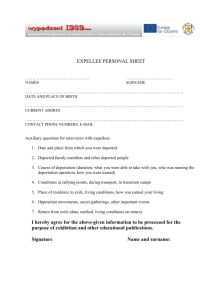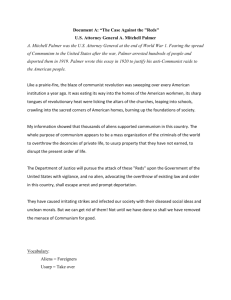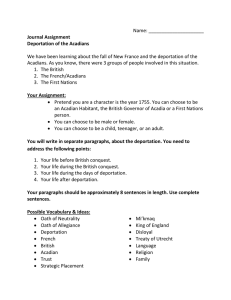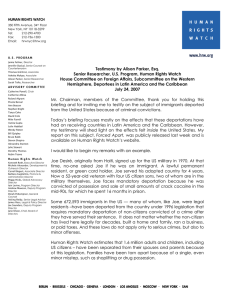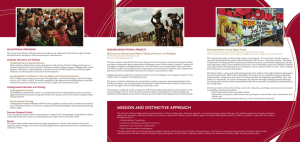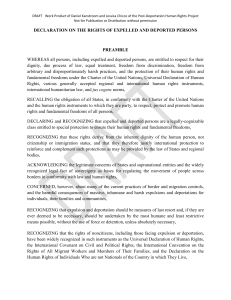Center Convenes Conference on a Draft Expelled Persons www.bc.edu/humanrights
advertisement
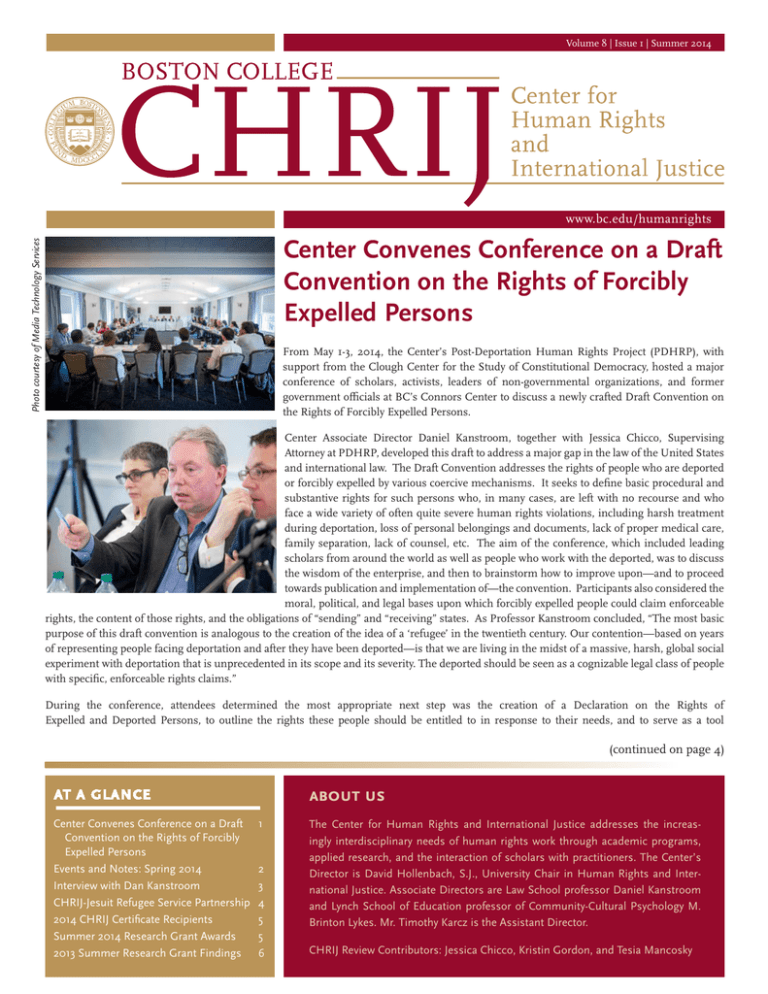
Volume 8 | Issue 1 | Summer 2014 www.bc.edu/humanrights Photo courtesy of Media Technology Services Center Convenes Conference on a Draft Convention on the Rights of Forcibly Expelled Persons From May 1-3, 2014, the Center’s Post-Deportation Human Rights Project (PDHRP), with support from the Clough Center for the Study of Constitutional Democracy, hosted a major conference of scholars, activists, leaders of non-governmental organizations, and former government officials at BC’s Connors Center to discuss a newly crafted Draft Convention on the Rights of Forcibly Expelled Persons. Center Associate Director Daniel Kanstroom, together with Jessica Chicco, Supervising Attorney at PDHRP, developed this draft to address a major gap in the law of the United States and international law. The Draft Convention addresses the rights of people who are deported or forcibly expelled by various coercive mechanisms. It seeks to define basic procedural and substantive rights for such persons who, in many cases, are left with no recourse and who face a wide variety of often quite severe human rights violations, including harsh treatment during deportation, loss of personal belongings and documents, lack of proper medical care, family separation, lack of counsel, etc. The aim of the conference, which included leading scholars from around the world as well as people who work with the deported, was to discuss the wisdom of the enterprise, and then to brainstorm how to improve upon—and to proceed towards publication and implementation of—the convention. Participants also considered the moral, political, and legal bases upon which forcibly expelled people could claim enforceable rights, the content of those rights, and the obligations of “sending” and “receiving” states. As Professor Kanstroom concluded, “The most basic purpose of this draft convention is analogous to the creation of the idea of a ‘refugee’ in the twentieth century. Our contention—based on years of representing people facing deportation and after they have been deported—is that we are living in the midst of a massive, harsh, global social experiment with deportation that is unprecedented in its scope and its severity. The deported should be seen as a cognizable legal class of people with specific, enforceable rights claims.” During the conference, attendees determined the most appropriate next step was the creation of a Declaration on the Rights of Expelled and Deported Persons, to outline the rights these people should be entitled to in response to their needs, and to serve as a tool (continued on page 4) AT A GLANCE Center Convenes Conference on a Draft Convention on the Rights of Forcibly Expelled Persons Events and Notes: Spring 2014 Interview with Dan Kanstroom CHRIJ-Jesuit Refugee Service Partnership 2014 CHRIJ Certificate Recipients Summer 2014 Research Grant Awards 2013 Summer Research Grant Findings ABOUT US 1 2 3 4 5 5 6 The Center for Human Rights and International Justice addresses the increasingly interdisciplinary needs of human rights work through academic programs, applied research, and the interaction of scholars with practitioners. The Center’s Director is David Hollenbach, S.J., University Chair in Human Rights and International Justice. Associate Directors are Law School professor Daniel Kanstroom and Lynch School of Education professor of Community-Cultural Psychology M. Brinton Lykes. Mr. Timothy Karcz is the Assistant Director. CHRIJ Review Contributors: Jessica Chicco, Kristin Gordon, and Tesia Mancosky Center for Human Rights and International Justice | Summer 2014 Center Notes & Events Selected stories and events the Center hosted in collaboration with other Boston College departments and groups in the Spring 2014 semester. Notes: »» The Center has endorsed a statement by the Society of Jesus urging elected officials to preserve due process protections for unaccompanied children arriving at the US border fleeing harm as guaranteed in the 2008 Wilberforce Trafficking Victims Protection Reauthorization Act. »» US Secretary of State John Kerry cited Center Director David Hollenbach, S.J.’s writings on human dignity in ensuring basic rights to clean water, democratic processes and freedom of religion in his remarks at BC’s 2014 commencement on May 19, 2014. »» The Center welcomes its new undergraduate interns this summer, Kristin Gordon A&S ’15, and Tesia Mancosky A&S ’15. »» The Center is in the process of forming an undergraduate student interest group affiliated with the Center this summer, with initial activities taking shape for the fall. Interested BC undergrads may contact Assistant Director Timothy Karcz at timothy.karcz@bc.edu for more information. »» To keep up with Center news and to receive reminders of upcoming events, sign up for the Center’s listserv (electronic mailing list) at http://www.bc.edu/humanrights/mailinglist. »» Center Associate Director Dan Kanstroom has been appointed to a three-year term on the editorial board for the journal International Migration Review. Events: »» On March 17, 2014, the Center hosted a screening of the documentary Harvest of Empire: the Untold Story of Latinos in America, which recounts the historical roots of US intervention in Latin America and makes connections to the waves of migrants arriving to the US from that region today. »» On March 31, 2014, the Center hosted Bethany Loberg of the SHARE Foundation and Wilfredo Medrano, a Salvadoran human rights activist, to speak about the search for truth, justice, and reparations in El Salvador. In their presentation, they criticized the amnesty law that was passed after the country’s civil war and which protects many perpetrators of human rights violations during the war from prosecution. Further, it has impinged upon efforts to publicly acknowledge what happened during the war, which has retarded the healing process for so many. Video of their presentation is available on the Center’s website: http://www.bc.edu/humanrights/Videos.html. Wilfredo Medrano and Bethany Loberg discuss human rights in El Salvador »» See other events the Center co-sponsored this spring on the Center’s website under Events. Page 2 Center for Human Rights and International Justice | Summer 2014 Interview: Professor Dan Kanstroom, Center Associate Director What led you to found the Post-Deportation Human Rights Project with (Center Associate Director) Brinton Lykes nearly a decade ago? I had been working in the immigration and deportation systems as a lawyer. As a researcher in an academic capacity, I had written about the history of deportation and why it had become such a strangely massive, strangely harsh, strangely intrusive enforcement system in a relatively short period of time. And the more I looked into that, the more I became convinced that it was worse than most people thought. In fact, in many ways it was worse than I had thought! Certain practices were beginning to take root in deportation—for example, people were being deported in very large numbers for very small offenses. And these were people who had been in the United States, often for many years, in legal status with their families. Others were being subject to all sorts of new, fast-track removal systems. It became increasingly clear to me that there was also a large group of people who had already been deported, who were bearing the brunt of these harsh policies that began essentially in 1996 and those people essentially had no rights after they were removed from US soil. So I started thinking about what could be done within the US legal system to reform that. I started researching a little bit after I was contacted by a couple of those people. One client’s case led me to a regulation that basically said that once a person is deported they have no more rights to try to reopen their case, even if they discover that the deportation was a mistake. So this offended my lawyerly sense, obviously. It just seemed fundamentally unjust to close the courthouse doors completely. However, these cases were unlikely to be taken up by most private attorneys, given their complexity, cost, and low probability of success. So I thought it would be a good project for a human rights center with the primary goal of conceptualizing this as a new area of law—post-deportation law, because as it stands now, in most of the country there is no such thing. So Brinton and I conceived the idea to start, in the spirit of the Center, an interdisciplinary, collaborative project to train researchers on these issues, not just on the legal side but also on psychological aspects of deportation and effects on families that Brinton had interest and expertise in. We hired a part-time attorney at first, Rachel Rosenbloom, who now teaches at Northeastern. Also, a BC law grad, Kathleen Gillespie, helped out tremendously with legal work at the beginning, as did many other students and lawyers. Brinton, together with Kalina Brabeck and many graduate students, has led very important research projects both in the US and in Guatemala as well. The project has evolved and grown greatly over the years, and continues to be very strong today with the excellent contributions of our Supervising Attorney, Jessica Chicco. But there remains a lot of work to be done. Your last book, Aftermath: Deportation Law and the New American Diaspora described a lot of the hardships faced day to day by deportees sent from the US in particular. Aftermath was a follow-up to my first book, Deportation Nation, which had examined the historical roots and the nature of the deportation system and why it had become so anomalous compared to, for example, criminal law. In criminal law, people have more rights than they do in deportation law. So Aftermath was an attempt to look at what the system has wrought since 1997 when the new laws went into effect. And, as I began to do research on that, I began to see that, first of all, the numbers were even larger than I had anticipated. Although we don’t really know to this day exactly how many, tens of millions of people have been removed or returned since the new laws went into effect. Many, many thousands of lawful permanent residents with green cards have also been deported. So I began to investigate the effect of these removals. The first and most obvious effect is the trauma of being uprooted yourself, which is profound. Second, there is often a sense of injustice about it. People get punished in the criminal system first. Then when that’s done, suddenly the federal agents show up and then the deportation process begins. So it feels like double punishment and in my view that is exactly what it is. Then of course there’s the trauma of families being separated, with typically fathers but also mothers being deported. And then I learned from talking to researchers that there is a terrible stigma in the countries to which they are sent and they are often mistreated. For example in Haiti, in El Salvador, in the Dominican Republic, we heard many reports that showed that people were being physically detained and often brutalized by corrupt government agents and others. They were stigmatized as being criminals or gang members. And it also began to occur to me that we had this group of people—I refer to them as the “new American diaspora”—who, even though they aren’t US citizens, are acculturated here, speak English, root for the Red Sox—Americans who suddenly find themselves back in Jamaica (for example) which they may have left when they were two years old. And they can’t find jobs and people don’t like them because they talk funny or they don’t speak the language or do so with an accent. The book tries to draw attention (continued on page 7) Page 3 Center for Human Rights and International Justice | Summer 2014 Center Partnership with Jesuit Refugee Service Continues The Center’s productive partnership with the Jesuit Refugee Service (JRS) continued this year on several fronts. Center Research Professor Maryanne Loughry, RSM, who also serves as Asssociate Director of JRS Australia, and Thomas Crea, Affiliated Faculty Member and Professor in the BC Graduate School of Social Work, continued their research on urban refugees. Urban refugees are believed to now make up over half the refugees in the world, making ever more urgent the need to understand how best to assist them. Late in 2013, a study was completed by Profs. Crea and Loughry building on their previous research conducted on urban refugees in South Africa. The previous research was done in conjunction with JRS’ Livelihoods Program, which is JRS’ primary vehicle to assist urban refugees. It identified significant environmental barriers to refugees’ attempts to build livelihoods, including community violence, crowding, harassment from landlords, and exploitation from officials and police. Efforts to build businesses were found to be hampered by an oversaturated market and significant distances from places of residence. Recommendations for service delivery included assessing refugees’ level of vulnerability and providing a more comprehensive and flexible package of supports. Currently, Professors Crea and Loughry are seeking funding to conduct a follow-up survey of Livelihoods beneficiaries, to examine how their income generation and overall well-being outcomes have changed over time since their participation in the program. To this end, the database of beneficiaries in the Livelihoods Program is currently being expanded to all JRS South Africa programs (Social Assistance, Health, and Education), in the interest of tracking beneficiary outcomes in those programs vis-à-vis program participation. Crea and Loughry are also seeking funding to expand their program formalization methodology to refugee camps in Malawi and Zimbabwe, with a focus on livelihoods based on agricultural production. New Publication Center Affiliated Faculty Member and BC Professor of Theology James Keenan, S.J. contributed a reflection on the topic of Jesuit Hospitality to a recent JRS publication focused on the concept of accompaniment entitled Side by Side: Learning What Accompaniment is All About. This contribution grew out of a joint JRS-Boston College consultation convened by Center Director David Hollenbach, S.J. and Prof. Loughry, and hosted at BC. The article and document may be viewed online here: https://en.jrs.net/assets/publications/file/sidebyside.pdf Other recent publications created with support from the Center-JRS partnership may be accessed at the Center’s website: http://www.bc.edu/humanrights/research.html Conference continued from page 1 for education and advocacy for activists to use. This Declaration was drafted during the conference and has been posted online, available through its new Wikipedia entry at https://en.wikipedia.org/wiki/Declaration_on_the_Rights_of_Expelled_and_Deported_Persons. The conference organizers are currently implementing many helpful suggestions from the enthusiastic response of attendees, including further iterations of the draft convention, creation of a website to offer public comment on the posted Declaration, possible model bi-lateral treaties, and a book project. See the interview with Professor Kanstroom in this issue for more about the conference and the declaration, and the factors that have led up to these efforts. Page 4 Center for Human Rights and International Justice | Summer 2014 2014 CHRIJ Certificate Recipients On May 14, the Center hosted its year-end event in which it presents its graduate certificate to its recipients. This year the certificate was earned by the eight following students. Congratulations to them all. Nelly Agyemang-Gyamfi M.A., Applied Developmental & Educational Psychology, Lynch School of Education David Chiwon Kwon Ph.D. candidate, Theology, Graduate School of Arts & Sciences Demet Arpacik M.Ed., Educational Leadership, Lynch School of Education Chiedza Mufunde M.S.W., Graduate School of Social Work Ava Floyd M.A., Applied Developmental & Educational Psychology, Lynch School of Education Mary Posman M.A., History, Graduate School of Arts & Sciences Claire Konecny M.A., Applied Developmental & Educational Psychology, Lynch School of Education Stephanie Nandoo M.A., Counseling Psychology, Lynch School of Education Summer 2014 Research Grant Awards The Center once again awarded summer research grants to both undergraduate and graduate students at Boston College this year. Here are this summer’s awardees and their research topics: Peter Cajka Ph.D. candidate, Philosophy Following Conscience Becomes a Human Right: Amnesty International’s Prisoner of Conscience Campaign, 1973-1991 Mabel Lee A&S ’15, International Studies and Economics NGOs as a supplement to education: An examination into the role of educational development in Peru Kevin Ferreira Ph.D. candidate, Applied Developmental and Educational Psychology Zacualpa, Guatemala, Youth Leadership and Life Vision Project Rocío Sánchez Ares Ph.D. candidate, Curriculum and Instruction Cultural Identity and the Education of Immigrant Youth in Galicia, Spain This also marked the second annual award of the Kelsey Rennebohm Memorial Fellowship, to honor the memory of Kelsey Rennebohm, a student in the Lynch School of Education who suddenly passed away in 2012. To reflect Kelsey’s passions, the award goes to a student whose proposed research or activist scholarship is at the interface of psychology, mental health, gender, social justice, and human rights. Here is this year’s recipient and topic of study: Gabriela Távara Vásquez Ph.D. candidate, Applied Developmental and Educational Psychology Indigenous Women’s Understandings about Mental Health, Wellbeing and Reparation (to be conducted in Guatemala) Page 5 Center for Human Rights and International Justice | Summer 2014 2013 Summer Research Grantee Reports Our 2013 Summer Research Grantees submitted research papers on their findings and presented their research on campus this past academic year, as part of the grant requirements. Here is a snapshot of their topics and findings: Demet Arpacik, M.A. in Educational Leadership ’13, Lynch School of Education Kurdish-American Students and Parents in Nashville Public Schools: Challenges, Needs, Experiences, and Expectations Arpacik conducted a qualitative study of Kurdish immigrants to better understand whether the educational institutions in the United States, and particularly in Nashville, are sensitive to the cultural and linguistic differences of minority students. The primary findings from the study focused on the importance of maintaining Kurdish religion and culture upon integration into the schooling system. Parents were generally satisfied with the schooling system, but were often found to be unaware of the experiences of their children. Students reported frequent religious discrimination or cultural segregation at school. Arpacik argues these could be mitigated through an increased intercultural understanding within the schooling system. This could be done by incorporating information on Kurdish immigrants into school curriculums to ensure that the environment is multicultural and inclusive. Sriya Bhattacharyya, Ph.D. candidate in Counseling Psychology, Lynch School of Education Can Policy Change Historical Discrimination? Exploring Experiences with India’s Caste-based Affirmative Action Policy Bhattacharyya researched how India’s affirmative action policy, intended to reserve seats in universities via quotas for Dalits (referred to by some as “untouchables” in India simply because of their low caste status) is experienced by students and educators in a diverse university setting. She found that participants’ opposition to or support of the affirmative action system differed by a resistance to social change or an embrace of social change, respectively. Participants resisting change discussed how quotas perpetuate competition for limited resources and harm general caste students, Dalits, and society. Participants embracing social change discussed how quotas can be used to overcome historical divisions, aid in social development, and ensure human rights to education. Students indicated that neither teachers nor administrators had drawn attention to caste integration issues during their education and shared a range of ideas about alternative solutions that might better promote inclusion of Dalits. Daniel Cattolica, Arts & Sciences ’14, Philosophy and Italian The G2 Generation: How Second-Generation Immigrants Are the Key to Italy’s Democratic Future There has been a rapid and recent increase in immigration to Italy as a result of the rise in individuals born within the country to immigrant parents. Cattolica’s paper examines the challenges that face these second generation immigrants, as they are neither socially nor legally recognized as true Italians because they are often unable to acquire Italian citizenship. As citizenship is both instrumental to obtain rights and symbolic to gain social acceptance, Cattolica voices his support of a modification of citizenship laws. Opponents voice resistance to this proposal, fearing of a loss of true Italian identity if all individuals are granted citizenship by birth within the country’s borders. Cattolica responds by stressing the need to see ethnic and cultural difference as a positive social good, and one that will bolster Italy’s political transparency and the political participation of its population. Mary Popeo, Arts & Sciences ’14, International Studies No More Fukushimas: Hiroshima’s Role in Advocating for a Broader Conception of Nuclear Disarmament Victims of the Hiroshima bombings have made the decision not to seek revenge, but to call for forgiveness, making Hiroshima a self-proclaimed model and “City of Peace.” Popeo’s paper evaluates the way in which the nuclear meltdown in Fukushima challenges the scope and meaning of Hiroshima’s commitment to nuclear disarmament and the anti-nuclear movement. Her analysis of the nuclear industry finds undeniable connections between nuclear energy and nuclear weapons, in which both pose a potential danger to humanity. While all nuclear power plants in Japan remain shut down, rising politicians and NGOs fail to maintain an anti-nuclear energy stance. Popeo argues that, by failing to condemn nuclear reactors and rally against the nuclear industry as a whole, Hiroshima limits its potential to be a city that promotes peace. Rocío Sánchez Ares, Ph.D. candidate in curriculum & Instruction, Lynch School of Education Building Pedagogies for Liberation: Guatemalan Teachers Meeting the Socioemotional and Educational Needs of Youth Affected by Migration Sánchez Ares collaborated with middle school teachers in Guatemala to develop a curriculum designed to meet the educational and socioemotional needs of youth affected by migration. Migration has been found to significantly impact youth development, especially in the case of transnational families. Yet, the current education system in Guatemala overlooks the needs of Mayan students, as the impact of migration is not addressed in educational policies and the national curricula. Through reflection on how one’s own teaching praxis may impact student well-being and academic performance, the group of teachers created a module program to be implemented that aims to increase youth self-awareness and personal development by drawing upon indigenous voices and experiences. The program also seeks to promote community activism to address social issues around migration. Page 6 Center for Human Rights and International Justice | Summer 2014 Kanstroom continued from page 3 to these problems and hopefully to inspire social workers, lawyers, academic researchers to care about that group because it was a forgotten group. In May you convened the conference which drafted the new Declaration on the Rights of Expelled and Deported Persons. Can you talk a little bit about it? This was the next logical step for me and it occurred to me that we needed to do something big and different to try to do three things. One was to continue to raise consciousness about this problem because it was not going away. Two was to bring together the best theoretical thinking that we could come up with, ranging from moral philosophy, theology, psychology, social work, and legal of course­—a very large span, and to bring those people together with activists who were beginning to be aware of this problem. So there were some groups, for example Chans Alternativ which deals with Haitian deportees, and another, Deported Diaspora, that works with Cambodian deportees. I thought that human rights law could provide a discourse that people might rally around and use to help them think this through. But also in my original thinking about this, it was going to be a convention which would be a binding legal instrument that governments could look at as well as non-governmental organizations. The main legal goal was to try to bring in some of the values that I’ve been talking about that deportees should have. Certain rights—rights to safe travel, of course, but also rights to maintain contact with their families and to be able to visit maybe after they have been deported. Rights to whatever social security payments they have earned. Rights to not be dropped in an airport in a country where they don’t know anybody. The basic theoretical insight that I had was that this was analogous to where thinking about refugees was in the 1920s—that you have a serious worldwide social problem and you have a class of people who don’t have any cognizable rights. My basic idea was that I want to spearhead the idea that deportees should be a cognizable class with enforceable, definable rights under international law that nation-states, both sending states and receiving states, should have to recognize. A classic way of beginning this is to develop a Convention or a Declaration on Human Rights. We decided to bring together all of these people for one preparatory conference last year and we later determined that a declaration would be the most useful instrument to begin with. We (Jessica, me, a Visiting Scholar named Tamar Lawrence-Samuel, and others) did a first draft and circulated that to various experts. And then, at the larger second conference in May, we brought in people who had worked in Europe because Europe is further along in recognizing these kind of rights than the US is. We also brought in people with experience in the government such as David Martin, former Deputy General Counsel at Homeland Security, and Steve Legomsky, former General Counsel at USCIS, as well as immigration judges who gave their insights. So now we have gotten input from a wide range of sources and I think we have a very good working draft and the goal is now to publicize it. We have put it up on Wikipedia now, and we are going to set up another site through our own website so that people can participate, make suggestions, maybe change it. You know, see where it goes. So it is about to be launched, that is the exciting thing. What do envision beyond these initial steps and where this might go? Well I am hoping that, first of all, activists will see this as a useful tool in their advocacy and that they will be able to convince governments in particular of the rightness of this and of the feasibility of it. While deportation should be a mechanism of last resort, if you have to do it, then you should do it in a humane way and with as little force as possible, in a way that respects human rights and human dignity. The other is that I am hoping this provides a discourse, a rhetoric, a framing for continued conversations about these problems which change all the time. You know, right now, we’re seeing an influx of children so that’s a whole other set of problems that hadn’t been thought about in quite the same way and now that needs some attention. So it’s an evolving project and it’s something that I feel very excited to be able to stay engaged with. We have student interns working on this, as well as people from a variety of disciplines who find this interesting and meaningful work. And I hope that this declaration will be a touchstone for all of that kind of work going forward. For an extended version of this interview including Prof. Kanstroom’s thoughts on the Obama Administration’s deportation policies, visit http://www. bc.edu/centers/humanrights/projects/deportation/pdhrpnews/kanstroominterview/. Page 7 Upcoming Fall 2014 Events wednesday, October 27, 2014 wednesday, November 19, 2014 “I was a stranger and you welcomed me”: A Catholic Vision for Immigration Reform Carolyn Forché Most Rev. Thomas Wenski, Archbishop of Miami and Chairman of the USCCB Committee on Domestic Justice and Human Development Poet and human rights advocate commemorates the 25th anniversary of the slayings of six Jesuits, their housekeeper and her daughter at the UCA in El Salvador 7:00 pm • Boston College, Heights Room, Corcoran Commons 4:30 pm • Boston College, Murray Function Room, Yawkey Center Church in the 21st Century Center event cosponsored by the Center Visit bc.edu/humanrights for the latest information and events or to view videos of past events. Join the CHRIJ listserv to receive news and reminders of CHRIJ events via email. Go to bc.edu/humanrights/mailinglist or scan the code on the left and simply enter your email address to join.
